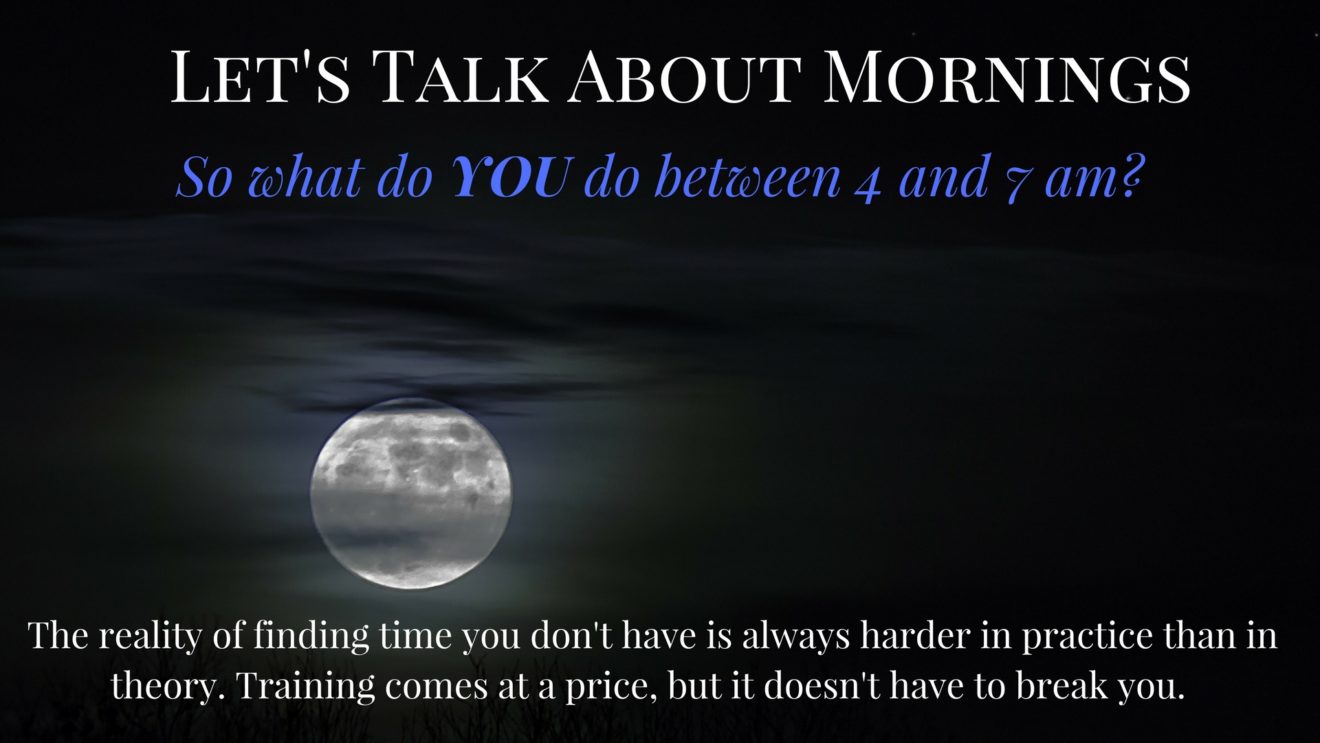
Finding the Time for Training Comes at a Price
Does making time for training feel impossible? You're not alone.
Let's guess the most common excuse used for not getting to the gym or committing to a fitness routine. I'm going with “I don't have time.” Honestly, who does? I mean how many people actually have the time to get dressed, get their butts out the door for a warm-up or mosey on down to the gym to spend an hour there? And it's not over after the workout. You still have to get back home to take a shower and add to the laundry pile.
I am by no means suggesting it's easy. There is always a trade-off. You may have to give up your favorite TV show, time to sit and read, browse useless things online (that you won't remember the next day because … well you just idly do this every evening) or … heaven forbid, it might cost you some sleep. The point is that we make time for things that are important to us.
Training is More Than Just a Workout
It's easy to think of training as the run or the gym session (or whatever else you're doing to challenge yourself). Training goes beyond that. It takes time to train your mind and body to adapt to a new routine. There is some discomfort in teaching your body to get up and do something instead of what it's used to doing. Getting your head to stop throwing excuses at you doesn't come overnight. Making time for training is tough!
It starts with a quality commitment to change. It is uncomfortable. Adjusting takes time. It will not feel so bad all the time – eventually.
The key is to stick with your commitment until it becomes a lifestyle. After that, you stop thinking about it. You stop giving yourself options. Sure, there are days I would rather stay in bed than get up, but my mind has accepted that the decision was made a couple of years ago and has learned better than to try argue about it.
It Comes at a Price
Mornings aren't my jam. Staying up late until the small hours of the morning and sleeping until 11 am would suit me just fine, if I could make it work with my training.
It Starts in Your Head. Your Body Will Catch Up.
Personal circumstances dictate the limitations on how and where to make time. If these change, your routine likely gets an overhaul as well. Two years ago I committed to training six days a week. I had the option of early in the morning or in the evening. It didn't take long to figure out that by the evening I really don't feel like doing anything.
Also, summers get really hot here and there are significant benefits to beating the worst of the heat. Waiting for paramedics to scrape my melted body off the scorching concrete at noon never quite made it to my bucket list.
Don't get me wrong. The first six weeks or so sucked, big time. It's just that now I don't think about it. It's normal.
By the time my brain is awake enough to reason that this is borderline insanity, I'm dressed and ready to go. May as well just get it done. And it's never that bad once you actually get going. OK, so most of the time it's not that bad. But even if it is, it's unusual for me to skip a workout. When I do, it's almost always because I have determined that my body is better off resting than training that particular day. Or perhaps it calls for trading one workout for a different one for one reason or another.
My decisions about training are far more commitment based than mood based now, compared to when I first started.
[clickToTweet tweet=”If we only do what we feel like doing, we would never accomplish anything.” quote=”If we only do what we feel like doing, we would never accomplish anything.” theme=”style5″]
Don't Make It Complicated
When you make a change to your routine, everything seems to get thrown for a loop. The first few days usually run on a blend of excitement and enthusiasm. Then reality bites. Nothing fits into the neat little boxes you had for them before. To make it harder, life doesn't fit into a neat little package as it is. Even when you have things organized, stuff happens to screw it all up.
Take charge of your changes. Be the boss of the pace and timing when you introduce them. Do not overwhelm yourself if you can possibly avoid it. Riding a runaway train is great in a theme park if you choose to ride it. In real life, not so much.
Making time for training is hard work. Credit yourself for the things you get right. Work on the ones you don't and roll with those that stress you out.
Roll with the punches. Keep it simple. Some people do exceptionally well taking on one complete lifestyle overhaul all at once. I think it's fair to say that most of us don't prefer that approach. It sounds great when you read someone else's impressive story, but it's not the only way to make a change. Generally, I prefer to tackle only what I can handle.
Once that becomes the new normal, I can add more changes. Find your tolerance zone – one that is practical and sustainable in the short term. Adapt to it and then tweak some more. This approach also helps me focus fully on the one or two changes I implement so that they really get ingrained into me before piling more things on.
Stop Looking For Perfection
I'm a big believer in reality.
Be real. Keep it real.
Trying to be a super hero is only fun on the good days, but will tarnish your self confidence really quickly when things don't go to plan. Don't give your circumstances the power to define you. One small, sustainable change that yields rewards is far more valuable than a slew of challenges that leave you feel drained and demotivated.
There will always be drains on your time. Life kind of sets us up that way, whether we like it or not. Finding the balance is never easy, but it is certainly possible.
You have a greater chance of being successful in making your changes if you are realistic in your expectations.
Acknowledge Your Accomplishments
Follow your own goal. Respect the limitations of your circumstances at any given time. Those who try are always ahead of those who procrastinate. Remember not to look at your efforts as a fail, just because some days don't go the way you planned. That doesn't make you a failure. It makes you human.
Watching others should make you feel motivated and comforted. If your role models make you feel inadequate, ditch them and find some new ones.
“I'm so inspired by this person because they make me feel like a total failure,” said no-one, ever!
You won't find the time and you have to make it by taking it from something else; usually something you really like to do. It's hard. Acknowledge that it's hard. But work with what you have.
Remember, it may all start with a feel-good idea, but it only really gets going with a quality commitment.







Awesome post Lee! Well said!